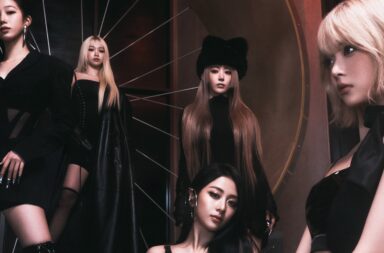“Do not go gentle into that good night… Rage, rage against the dying of the light.”
-Dylan Thomas
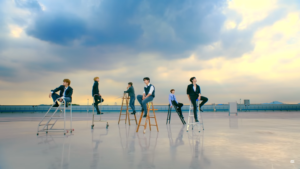
The evolution of a sunset can be broken down into “magic hours” (when the sun begins to sink lower and the sky turns red, orange, and yellow) and twilight (civil, nautical, and astronomical). During twilight, the sky begins to turn blue before sinking into the night. Likewise, Wei’s debut album Identity: First Sight explores a sunset from the beginning of the golden hours to the end of twilight sonically and conceptually.
Interestingly, the sound of the tracks and their actual timbre are a bit contradictory in the case of the track order and the sound of “twilight” itself. “Twilight,” “Doremifa,” and “Fuze” are electrifying and bright, more akin to what the beginning of sunset would sound like, outlined in shades of orange, red, and yellow. “Fuze,” just like its name, is fiery, smoldering, and sexy, foreshadowing the darkness that is yet to come (and all the mystery that accompanies night). “Doremifa” is fun, bright, and sunny, like the exciting end of activity before the sentimentality of twilight approaches. “Twilight” is similarly upbeat, light-hearted, and playful, contrary to what its name might suggest. In contrast, “Timeless” and “Hug You” are sentimental and slightly melancholy, exemplifying a stillness that mirrors an actual twilight sonically, evoking cool hues of blue and purple instead.
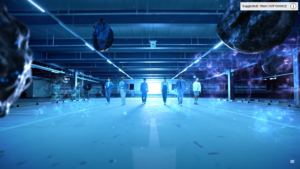
To their credit, there is a darkness and allure in the MV for “Twilight” that resonates with the dark part of the twilight concept. Images of stars, unnamed planets, and interstellar backdrops exemplify the dark elements, while the sound of the song more closely resembles the beginning of sunset, or what is referred to as the “golden hour.” For one of their debut stages, they actually described the song as “heading toward a happy ending” and “embracing the brightest star Sirius in the twilight.” Also called Alpha Canis Majoris or the Dog Star, Sirius is 25.4 times more luminous than the sun and means “sparkling” or “scorching” in Greek. Incorporating the literal brightest star in the sky within the darkness of space provides an added depth to the spectrum of their sunset imagery.
The music itself is a diverse mix of fun, flirty, and teasing. The vocal ad-libs and whistle motives throughout give the song a lightness and playfulness while the heavy overdubbed bass, electronic piano, and drum tracking are more akin to a smoldering romance track that evokes the feeling of smirks and intimacy. As a whole, the mix of the boys’ voices make for a nice timbral soundscape alongside their feathery falsettos and offhand, smooth rapping. Musically, the contrast between musical and vocals parts utilized throughout the track are the most stand-out parts of the song.
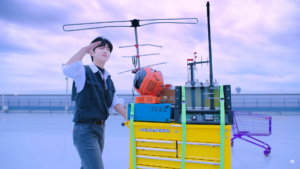
The two other tracks that most closely relate to the warmer hues of the sunset are “Doremifa” and “Fuze.” “Doremifa” sounds similar to “Twilight” but leans more heavily into the electronically synthesized accompaniment, making it a more straightforward pop track. It is fun, no frills, and without surprises. It evokes feelings of laughter and companionship in pursuit of the sunset as the sun begins to sink low in the sky.
“Fuze” is a bit smokier and sexier in comparison. Composed by the leader Jang Daehyeon, their performance stage literally utilizes fire as the backdrop. Driving bass, thick rhythmic layering, and autotuned electronic strings support sizzling, whispered vocals. “Fuze” is exciting with forceful cries of “on fire.” This track sounds like the moment of thrown away inhibitions and a little bit of danger: the “rage, rage” part of the dying light like in Dylan Thomas’s well-known poem.
The remaining songs “Timeless” and “Hug You” are soft and sentimental, even a bit melancholy. Interestingly, a lot of the electronic mixing sounds similar, but with different textures created by different combinations of those same sounds. In “Timeless,” the same persistent bass and electronic strings are inlaid aside acoustic guitar and refreshing piano riffs. “Hug You” is similar in sound, but more subtle still with thinner layering and more ethereal backing in the verses. The sound and lyrics make an earworm of a song, but it does not really have any defining characteristics that make it a stand-out track on the album.
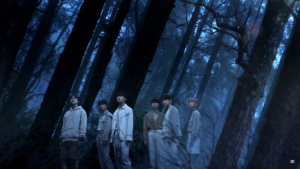
While the whole world copes with the fallout of whatever weird, dark year 2020 is, I think this all too real sentiment of fighting to reach the brightest point amid the darkness would resonate with most. Wei’s debut album Identity: First Sight capitalizes on this plight and truly personifies a sunset from the first moments of the sun sinking below the skyline to the depths of twilight before true darkness, both in sound and concept.
(PhotoPills, YouTube [1][2], Britannica, Images via Oui Entertainment)


